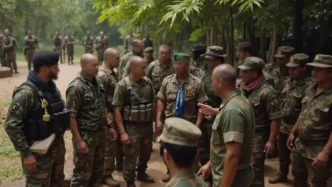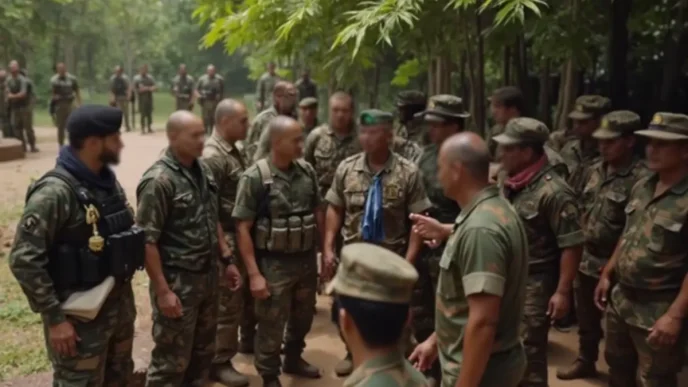As the Philippines gears up for crucial elections in May, a shadowy digital threat looms over the democratic process. Lawmakers have sounded the alarm over a surge of fake social media accounts promoting former President Rodrigo Duterte, which they say are undermining voter trust and distorting public discourse. With reports of organized disinformation campaigns targeting millions of Filipinos, concerns are mounting that the integrity of the electoral process could be at stake.
Rising Tide of Digital Deception
The issue came to light following a Reuters report highlighting the proliferation of fake accounts tied to discussions of Duterte’s recent International Criminal Court (ICC) case. According to the report, approximately one-third of social media profiles praising Duterte and criticizing the ICC were identified as inauthentic. Further analysis by Israel-based tech firm Cyabra revealed that similar tactics are being deployed in a deliberate effort to influence public perception ahead of the upcoming elections.
Senior Deputy Speaker Aurelio “Dong” Gonzales Jr. condemned the trend as a direct assault on democracy. “We must defend the Filipino people not just from guns and goons, but from ghost accounts flooding their social media feeds with propaganda and deception” he said. Gonzales emphasized the scale of the problem, warning that the ability of bots, trolls, and fake profiles to reach millions with misleading content poses a grave risk to the democratic process.
Deputy Speaker David “Jay-Jay” Suarez echoed these concerns, describing the phenomenon as a form of “digital warfare.” “This is a wake-up call. The weaponization of disinformation to mislead, misinform, and manipulate voters is one of the gravest threats to our democracy today” he said. Suarez underscored that the battlefield extends beyond the internet, targeting the very hearts and minds of Filipino voters.
Organized Campaigns and Electoral Impact
The use of fake accounts is not a new tactic in Philippine politics, but the scale and sophistication of current efforts have raised fresh alarms. Analysts suggest that coordinated campaigns, often referred to as “click armies,” are designed to amplify specific narratives, drown out dissenting voices, and shape voter sentiment. In the context of the May elections, such strategies could sway undecided voters or polarize communities, potentially altering electoral outcomes.
The Reuters report pointed to a systematic approach, with fake accounts operating in tandem to promote pro-Duterte messaging while discrediting opponents and institutions like the ICC. This mirrors broader global trends, where disinformation has been weaponized in elections from the United States to India. In the Philippines, however, the hyper-connected nature of social media—where platforms like Facebook and X are primary sources of news for many—amplifies the impact. With over 80 million internet users in the country, according to recent data, the reach of these campaigns is staggering.
While no definitive evidence links these accounts to specific political actors or campaigns, the timing and focus on Duterte suggest a targeted effort to bolster his influence amid ongoing legal and political controversies. If confirmed, such actions could violate electoral laws and erode public trust in the democratic system. For now, lawmakers and observers are urging caution and vigilance as investigations continue.
Calls for Action and Accountability
In response to the growing threat, Gonzales has called for a nationwide effort to combat digital deception. He urged key government bodies, including the Department of Education, the Commission on Higher Education, and the Department of Information and Communications Technology, to launch a joint national digital literacy program. The initiative would aim to equip students and the public with the skills to identify and resist coordinated disinformation campaigns.
Gonzales also appealed to political parties to refrain from employing “click armies and paid influencers” in their campaigns, emphasizing the need for ethical standards in electoral politics. His plea reflects a broader concern that the normalization of such tactics could set a dangerous precedent, undermining the fairness of future elections.
For his part, Suarez directed criticism at social media giants, urging platforms like Meta, X, and YouTube to take more proactive measures against inauthentic accounts. “They have the resources and the algorithms to detect inauthentic behavior. They can’t just turn a blind eye while democracy is under attack” he said. Suarez’s comments highlight a growing frustration with tech companies, which have faced scrutiny worldwide for their handling of disinformation and election interference.
Suarez also stressed the importance of empowering voters to navigate the digital landscape. “The Filipino voter is smart, but we owe it to them to give them the tools to fight back against deception. Let’s raise media literacy, promote digital hygiene, and ensure our elections reflect the people’s will—not the will of shadow operators” he said.
Broader Implications for Democracy
The surge of fake accounts in the Philippines is emblematic of a larger challenge facing democracies worldwide: the intersection of technology and political power. Social media, once hailed as a democratizing force, has increasingly become a double-edged sword. While it offers unprecedented access to information, it also provides fertile ground for manipulation and deceit. In the Philippine context, where historical and cultural factors often amplify political polarization, the stakes are particularly high.
Experts warn that unchecked disinformation could exacerbate existing tensions, particularly in a country with a history of electoral violence and contested results. The 2016 election, which saw Duterte rise to power amid a wave of populist rhetoric, was itself marred by allegations of online propaganda and troll farms. If similar tactics are at play in 2025, they could further erode public confidence in institutions already strained by years of political upheaval.
Moreover, the focus on Duterte—whose legacy remains deeply divisive—adds another layer of complexity. Supporters view him as a strongman who tackled crime and corruption, while critics decry his human rights record and authoritarian tendencies. The ICC case, which investigates alleged extrajudicial killings during his “war on drugs,” has reignited these debates, making him a lightning rod for both genuine and manufactured online sentiment.
Challenges of Enforcement and Education
Addressing digital disinformation is no easy task. While lawmakers push for stricter regulations and platform accountability, enforcement remains a challenge. The Philippines has laws against electoral fraud and misinformation, but applying them to the nebulous world of social media is often impractical. Identifying the orchestrators of fake account networks—whether local operatives, foreign actors, or a combination of both—requires resources and expertise that many governments lack.
Digital literacy programs, while a promising solution, face their own hurdles. Rolling out nationwide initiatives demands significant funding, coordination, and political will. In rural areas, where internet access and education levels vary widely, reaching vulnerable populations is particularly difficult. Yet, as Gonzales and Suarez argue, equipping citizens with critical thinking skills is essential to safeguarding democracy in the long term.
Social media platforms, meanwhile, are caught between competing pressures. While they have introduced measures to flag false content and suspend fake accounts, critics argue these efforts are often reactive rather than preventive. Balancing free speech with the need to curb harmful content remains a contentious issue, especially in politically charged environments like the Philippines.
Looking Ahead to May
As the May elections approach, the battle against digital deception is set to intensify. For Filipino voters, the challenge lies in discerning truth from propaganda in an increasingly crowded and noisy online space. For lawmakers and activists, the task is to build resilience—both through policy and public awareness—against a threat that evolves as quickly as the technology behind it.
The voices of Gonzales and Suarez serve as a reminder that democracy is not just about casting votes, but about ensuring those votes are informed by reality, not illusion. Whether the Philippines can rise to this challenge remains an open question, one that will shape not only the outcome of the upcoming elections but the future of its democratic fabric.














